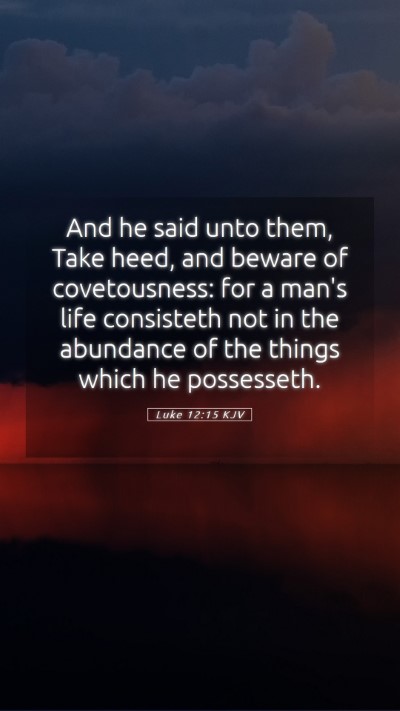Understanding Luke 12:15
Luke 12:15 states, "Take heed and beware of covetousness: for a man’s life consisteth not in the abundance of the things which he possesseth." This verse is rich in meaning and invites us to delve into its significance through careful examination. Below is a comprehensive commentary derived from respected public domain sources such as Matthew Henry, Albert Barnes, and Adam Clarke.
Bible Verse Overview
This verse issues a solemn warning against covetousness—excessive desire for what others possess. Jesus emphasizes that a person's worth is not determined by material wealth. The context of the passage reveals a larger conversation about priorities in life, highlighting the transient nature of earthly possessions.
Verse Analysis and Commentary
-
Warning Against Covetousness
Matthew Henry notes that covetousness leads to a variety of ailments, both spiritual and personal. It seizes the heart and distorts one’s priorities, often leading to discontent and resentment. The exhortation to "take heed" signifies the need for vigilance against the lure of wealth and possessions in our lives.
-
Life Not Measured by Abundance
Albert Barnes emphasizes that life consists of far more than material wealth. True fulfillment and richness stem from spiritual health and relationship with God. This aligns with broader biblical themes that suggest the accumulation of goods and wealth cannot satisfy the deepest longings of the human soul.
-
The Nature of True Riches
Adam Clarke provides insight into the nature of true riches, which he defines as spiritual in essence. He argues that those who pursue spiritual gain—character, relationships, and faith—ultimately find a more substantial and lasting contentment compared to those who chase after transient material wealth.
Historical Context
Understanding this scripture requires consideration of its historical context. During Jesus' time, material wealth was often seen as a sign of God's blessing. The societal norms may have led some to believe that abundance equated to personal worth. Jesus' teaching flips this notion, emphasizing the spiritual over the material, encouraging listeners to focus on what truly matters.
Applying the Meaning of Luke 12:15
There are several ways to apply the teachings from this verse:
- Self-Examination: Regularly assess one's desires and motivations in life to ensure they align with spiritual values rather than materialistic goals.
- Contentment and Gratitude: Encourage an attitude of gratitude for what one has, recognizing that fulfillment does not depend on accumulating more.
- Focus on Spiritual Growth: Invest time in developing character, relationships, and faith, seeing these as true measures of wealth.
Bible Cross References
- Matthew 6:19-21: "Lay not up for yourselves treasures upon earth... for where your treasure is, there will your heart be also."
- 1 Timothy 6:10: "For the love of money is the root of all evil..."
- Ecclesiastes 5:10: "He that loveth silver shall not be satisfied with silver; nor he that loveth abundance with increase..."
Conclusion
In sum, Luke 12:15 serves as a vital reminder that material possessions do not define our lives or our worth. Through the insights provided by Matthew Henry, Albert Barnes, and Adam Clarke, we understand that true richness can only be found in spiritual pursuits. As we engage in Bible study groups or online Bible study resources, let us integrate these insights into our lives, fostering a deeper understanding of Scripture and its application to daily living.


